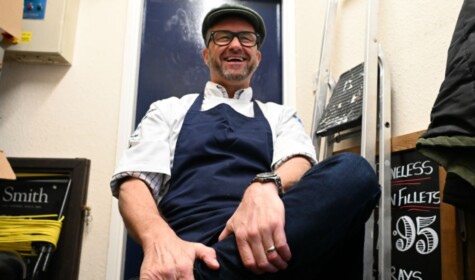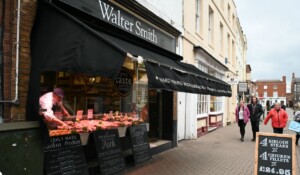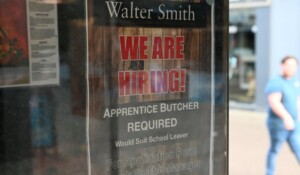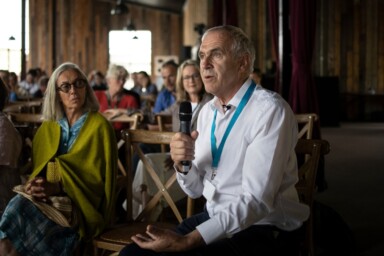In our series of butcher profiles, food and farming writer, Marianne Landzettel, meets butchers from across the UK who have built their business around high welfare, sustainably produced meat. Here, we travel to the West Midlands to meet National Craft Butcher, Robert Jones, who is proud to be continuing a 140-year legacy.
A sepia-coloured photo shows three butchers and a very young apprentice, all in long white aprons, standing in front of rows of beef carcasses hanging from the ceiling. Before them, spelt out in sawdust is the name of the butcher and founder, G.A. Smith.
Robert Jones shows me the picture reproduced in a small brochure in 1985, commemorating ‘Walter Smith – Family Butcher for 100 Years’. Walter Smith really expanded the business, says Jones. “For a long time, the West Midlands had the highest concentration of butcher shops in the UK because of the heavy industry.” We sit in the tiny office behind the company’s butcher’s shop in Litchfield. It is an old-fashioned high street butchers with chalk boards on the pavement outside announcing the specials, and an awning to keep the sun away from the beautifully decorated meat display in the shop window: roasts and cuts of meat, and as a centre piece, chicken breasts arranged in the shape of a flower.
Today, Walter Smith Fine Foods runs 12 outlets, some in and around Birmingham, the others scattered across the Midlands and south England.
Born in 1964, Jones has been working for the company since he was a teenager. He comes from Shelfield, a small community between Walsall and Litchfield. He was four when his father, a grocer, suddenly died. He grew up in his grandparents’ house with his mother and older sister. “I was a troublesome boy,” he says, “I did not do well in school; my mother was very academic, she always thought I was lazy.” He was already in his 40s when he was finally diagnosed with Irlen syndrome. It’s hereditary and his son also has the condition which was picked up during a routine screening at school: light sensitivity, and problems with reading, attention span and concentration are among the typical symptoms. Wearing coloured glasses helped to focus better. “Before, my thoughts were going off in several different directions at once,” he says.
Sitting still in a classroom just didn’t work. With the help of an understanding truant officer, he was allowed to skip most of his last year at school and instead he started helping out at the Walter Smith butchers where his brother-in-law was working. He still remembers his first week’s pay check of £14 and the freedom it provided to buy a Stranglers’ LP or even a new pair of Levi’s. But it wasn’t just about earning some money, from day one, he was fascinated by the work the butchers did: “I was seeing a whole carcass come in through the backdoor, and happy customers leaving with sausages, bacon and roasts through the front door.”
Jones joined when the business was still in its heyday: there were 40 Walter Smith outlets, a freezer centre, a pie factory, and a factory to cure bacon and prepare cuts. The company was known for running its own butcher training programme. He was one of about 30 apprentices who attended the company’s own butcher school in Birmingham for a minimum of one day a week. “We were taken to a live mart to buy cattle, we went to an abattoir to watch slaughter. The next day we had to evaluate the carcasses. The lesson was: the cheapest cattle you can buy, will turn out to be the most expensive because it gives you the poorest yield,” says Jones.
It took at least three years to become a qualified butcher, says Jones, and for those with ambition and talent there was a career path to become head butcher, assistant manager, and finally area manager.
Jones was 27 when he became the manager of one of the smaller shops. By then the decline of the industry was well under way. Butchers were not only closing because they could not compete with supermarkets, in the Midlands, the heavy industry sector was deep in crisis. “As the factories closed we lost customers,” says Jones. “We gave up two of our highest grossing shops, one was next to the Rover plant, the other in Nottingham, close to a coal mine.” For some years, Walter Smith outlets in shopping centres did well, but the rents kept increasing. “There came a point when it cost you £2,000 a week to just open the door of the shop, and that sum covered only rent and business rates, not wages, water and electricity.”
As area manager and later one of the Walter Smith directors, Jones knew that things had to change and change fast. The West Midlands still has pockets of wealth, he says, but the customers there don’t tend to buy at traditional butchers. “We need to be where the customers are,” he concluded. Of the 12 outlets Walter Smith Fine Foods operates today, only two are traditional high street butcher shops, the others are integrated into garden centres. Wait, what?
“Garden centres are open seven days a week, they have a big car park, and the customers have disposable incomes,” says Jones. During the week, the customers are mostly retirees. They buy plants and then stop for a cup of tea and a sandwich, but the busiest days are Saturday and Sunday, when whole families come. All 10 garden centres with Walter Smith Fine Foods, have a partnership with Waitrose, which supplies everything except meat products. With a café, a play area for children and convenient options for food shopping, the garden centres become good venues to spend the better part of a day, says Jones.
The produce and products on offer at the Walter Smith garden centre shops are exactly the same as you would find in a traditional high street butchers, and they are prepared in-house, and “Eighty percent of what we sell, including cured bacon and sausages, is made from carcasses on site”.
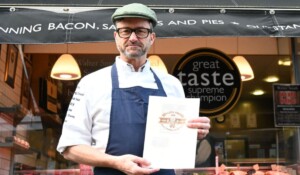
Value for money also means making the best use of every carcass, and for Jones that continues to be one of the best parts of the job. He honed his skills at butcher competitions. “The butchers get a carcass, a lamb, or a quarter of beef and a side of pig, and within a given time, they have to butcher it and present the meat ready to cook.” Jones won his first competition when he was just 21. To showcase what can be done with two lamb carcasses he picked a ‘Welsh versus Chinese dragon’ theme, presenting the meat for a variety of dishes beneath two dragon cut-outs respectively on green and red silk. Creativity and quick lateral thinking have always been his strength. At the time, he didn’t know that he had Irlen syndrome, but today he reckons that his thoughts “going off in several directions at once” may help him to make different mental connections and quickly come up with new and sometimes interesting ideas.
Presentation matters, he says, it’s a form of communication with the customer. He encourages sales staff and butchers to take pride in how meats, sausages and pies are displayed – the Litchfield shop attests to that.
The job of butchers is changing, says Jones. Actual butchery is just part of what they do, culinary skills, management and people skills are becoming as important. “We need to do something different” is Jones motto. The produce has to be seasonal – meat for braising and stews in winter, a good selection of marinated meats and sausages for grilling in summer. “What do you think we could offer for Mothering Sunday?” he asks the sales staff as he inspects the display.
Product development is another part of the job Jones really enjoys. “In future we will have to produce more oven-ready products,” he says. “The new generation of consumers is time poor. They want fresh food, but it needs to be ready within a short time and without much effort. It must feel as if you’ve cooked, though you actually haven’t.” Apart from pies, he and his team have developed various marinated, ready to grill meats. They think about adding vegetables to make it into a complete ready meal, but fresh instead of frozen, and available not in a supermarket cooler but at the butchers. Jones is experimenting with ‘young flavours’ such as meat in peri-peri sauce – the Moroccan lamb sausages with raisins are already a success. Chicken with smoked gammon, garlic and chili and chicken chorizo pie might be next.
As tastes and consumer habits change, butchers have to do things differently, too. Since the company was founded in 1885, the business has had to fundamentally change many times, says Jones, who sees himself as a caretaker for a period of time in the company’s over 140-year history. He hopes his legacy will be to have set the Walter Smith chain of butchers onto a path to a sustainable future.
With thanks to National Craft Butchers for helping us to develop this series. To find out more, visit NationalCraftButchers.co.uk.
Photos by @M.Kunz
